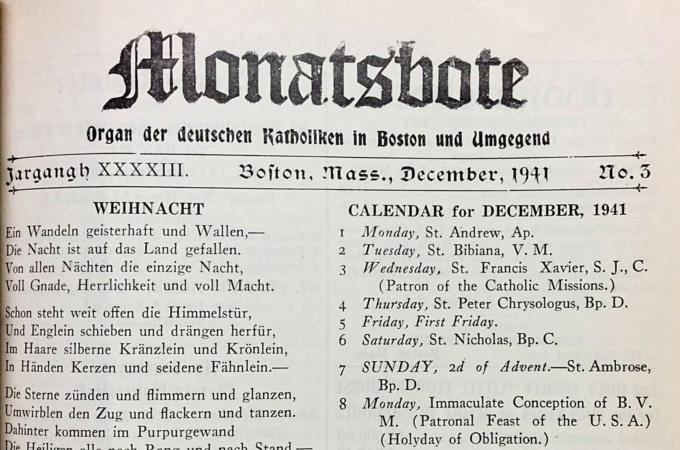The Monatsbote, the voice of the German Catholic community
Dec. 7, 2016 marks the 75th anniversary of the attack on the United States naval base at Pearl Harbor. The following day, the United States declared war on Japan, entering World War II, and prompting Germany to declare war on the United States on Dec. 11.
While the Catholic immigrant communities from Ireland, Italy, and other countries are often acknowledged, less so is the German Catholic community which existed within the archdiocese throughout much of its history. As they had in World War I, this community once again found its loyalty under scrutiny, as they searched their own consciences to determine whether their allegiances lay with the home of their ancestors, or with their own nation.
One collection which lends some clues is the Monatsbote, or "Monthly Messenger," a newsletter published by the now-closed Holy Trinity Church, the center of the German Catholic community in Boston. The Monatsbote was first published in September of 1899, and continued through 1972. It was originally all in German, but within the first decade included a substantial number of columns in English, as well. Regular features included a calendar of parish events, the pastor's message, and event recaps, among others.
The war is first mentioned in the pastor's message of the January 1942 issue. He writes that "in the present state of the war, we will eagerly endeavor to do for our dear country, the United States, in action, prayer, and sacrifice all that is in our duty and our powers."
He reminds his congregation of their forefathers, whom God had inspired to leave their "Fatherland," seeking the freedom and opportunities offered by the United States. He continues, writing that "they became citizens and grew in love and devotion to their adopted country." That they were proud of their American citizenship.
Despite this initial message, there appear to be relatively few patriotic exhortations or opinion articles as the war progressed, and for the most part, the newsletter continued to print its regular features. Even as victory was secured in Europe, only the pastor's message refers to it indirectly, praising the nations meeting to ensure peace around the world. The conspicuous absence of such articles in itself may be evidence of the internal struggle facing this community, and certainly a sign of the respect they had for family members still residing in Europe, their ancestors, and culture.
What the Monatsbote does overtly reveal is the involvement of the parishioners in the armed services, and the support the parish provided to them and their families. As the United States was beginning to mobilize, the parish offered comfort to the families of servicemen and women through prayer. One column encourages "all families of our parish and their friends outside the parish, whose sons have joined the army, make it a special practice to come to our shrine of the Immaculate Conception and pray for their soldiers." Likewise, that all who are leaving for service come with their family on the eve of their departure, to "consecrate their bodies and souls to Our Blessed Mother, the Health of the Sick and the Patroness of the United States."
A new regular column also appeared, titled "News from the Armed Forces," which contained excerpts of letters from parishioners, both men and women, serving abroad. It later included their photographs with a caption indicating where they were stationed. The column continued to be published for several months after the war and eventually disappeared.
The Monatsbote is an incredibly valuable resource for those interested in the German Catholic community and the history of the Holy Trinity parish. In relation to World War II, the silences or absence of certain features are sometimes more telling than what is written, though through the body of published letters we can see that, despite any internal struggles, the parish showed overwhelming support in the service of its country.
THOMAS LESTER IS THE ARCHIVIST OF THE ARCHDIOCESE OF BOSTON.



















